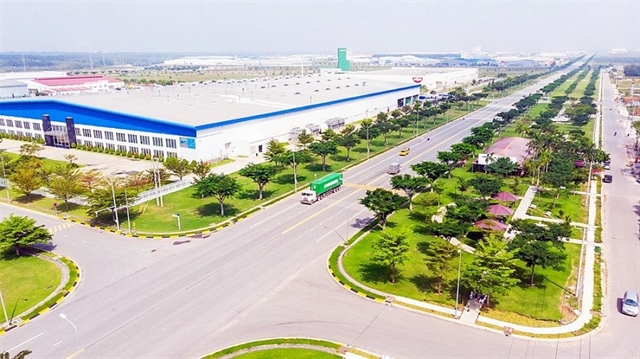 Economy
Economy


|
| An industrial cluster in Hà Nội. The city has solutions to promote further development of industrial clusters in the future. Photo baocongthuong.vn |
HÀ NỘI — The People's Committee of Hà Nội is considering withdrawing investment certificates from slow-moving industrial cluster projects.
The measures would apply for projects that have still to make progress 12 months after the issue of investment certificates, according to Decision 33/2022 on the regulation on management of industrial clusters in Hà Nội effective from October 14, 2022.
This decision includes regulations on the establishment and adjustment of industrial cluster development plans; and building and expanding the industrial clusters.
It also contains regulations on carrying out projects on building technical infrastructure of industrial clusters.
The decision also has regulations for State management offices relating to the operation of industrial clusters in the city, including cooperation and responsibilities between the offices and authorities of districts in Hà Nội to improve the efficiency of industrial cluster management.
Those aim at ensuring consistency and creating favourable conditions for investors in investing in production and business in the industrial clusters.
According to the Hà Nội Department of Industry and Trade, the State agency managing industrial clusters in Hà Nội, there are 70 industrial clusters operating in the city, attracting about 3,900 households and enterprises to invest in production and business activities.
In the 2018-2020 period, Hà Nội decided to establish 43 new industrial clusters, meeting demand for the development of industrial sectors.
However, the city has so far started construction on just seven industrial clusters due to many difficulties. They include Đại Thắng and Phú Túc projects in Phú Xuyên district; Dị Nậu project in Thạch Thất district; Thắng Lợi and the second stage of Tiền Phong projects in Thường Tín district; the second stage of Đan Phượng project in Đan Phượng district; and Võng Xuyên project in Phúc Thọ district.
The progress of building the industrial clusters in Hà Nội is still very slow compared to the plan due to overlapping regulations, procedures and permits, according to the department.
Especially, the procedures on getting the Prime Minister's approval on changing the purpose of land use still takes time, affecting site clearance and issuance of construction permits.
About 20 industrial clusters must get permission on changing the purpose of land use from agriculturial land to industrial land, while only three of them have so far received approval.
In addition, the site clearance work is still slow, not meeting the building schedule. At present, 16 industrial clusters are not yet eligible for site clearance, and some have less than 50 per cent of site clearance completed.
In the future, localities will continue to review existing industrial clusters and remove those no longer suitable for development, and renovate operating ones.
The department will continue to closely coordinate with relevant departments, sectors and authorities of districts to remove difficulties in building technical infrastructure at the industrial clusters.
It also promotes the development of more large-scale industrial parks and clusters in an environmentally-friendly manner, and high-tech industrial production such as microchips and electronic equipment for export.
According to the Hà Nội Industrial Cluster Development Plan by 2030, the city will have 159 industrial clusters with a total area of more than 3,200 hectares. VNS




